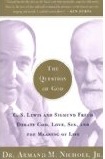
 |
The Question of God: C.S. Lewis and Sigmund Freud |
Armand Nicholi, The Question of God: C.S. Lewis and Sigmund Freud Debate God, Love, Sex, and the Meaning of Life. Free Press, 2002. 295 pages. $25.00, hardback.
In a society fraught with ideological conflict, it is rare to find a genuinely philosophical debate between an atheist and a believer. Instead, we too often have name-calling and litigation. Yet into these culture wars comes a fascinating and winsomely written book that constructs a wide-ranging debate between C.S. Lewis (a Christian) and Sigmund Freud (an atheist). The author, Armand Nicholi, a professor of psychiatry at Harvard Medical School, displays a keen knowledge of both thinkers and offers astute psychological insights into their lives.
Besides being a noted psychiatrist and the brilliant founder of psychoanalysis, Sigmund Freud (1856-1939) was one of the most influential atheists of the twentieth century. For him, psychoanalysis was not only a theory of the human mind, but a scientific worldview that banished God and liberated humanity from the bondage of religion. Freud made this case in several of his many books. Freud rejected the Jewish faith of his parents and, outside of a flirtation with belief in God during college, was a confirmed atheist throughout his life. Having painfully experienced anti-Semitism and the rise of Nazism, he found the world an excruciating place. He was often disdainful toward others. He worked intensely on his psychoanalytic theories, craved fame, and suffered from the rejection of his ideas by many leading thinkers of the day. He also lamented the defections of early followers, such as Carl Jung, who rejected Freud’s view of religion.
Freud contended that religion could be explained by strictly psychological factors. God was nothing more than a “projection” of a benevolent father image onto the screen of a hostile and uncaring universe. Religion was, to Freud, an “illusion” and “a universal obsessional neurosis,” a pre-scientific superstition. Freud reduced love to biological, genital urges. He often wrote of death, and experienced a terrible and sometimes superstitious fear of his own demise. Freud died in England at age eighty-three, one year after he had fled Germany to escape the Nazis. After a long sickness, he was given a lethal dose of morphine, per his own request.
C.S. Lewis (1898-1963) was the most influential Christian writer of the twentieth century. After the death of his mother when he was nine years old and his subsequent unhappy days in a boarding school, Lewis became an atheist. He later advanced in the academic world. As a professor at Oxford he discussed religion with believers such as J. R. R. Tolkien, author of Lord of the Rings, and read Christian writers such as G. K. Chesterton. In his early thirties Lewis embraced Christianity and thereafter explained and defended it in many and various writings. After his conversion, Lewis became more affable and peaceful than he had been as an atheist.
Lewis, too, wrestled with evil in the world. He grieved deeply over the death of his wife. But he did not believe evil disproved God; rather, God used evil for good purposes not otherwise attainable. Lewis argued that the desire for God and heaven was not neurotic, but provided evidence that God has given mortals a need for the divine. Just as the hunger for bread does not insure that one will be fed, the hunger for heaven does not mean one will find it. However, as hunger for bread in a world without bread makes no sense, so hunger for heaven in a world without heaven makes no sense. Lewis saw love not as mere biology, but as a doorway into the realities of divine love. He argued that conscience was a witness to an objective moral law and its Lawgiver, and that Jesus Christ could not logically be viewed as a mere moralist or a sage. Lewis died at age sixty-four in good spirits.
Nicholi’s presentation is fair, dispassionate, and thorough. He does not prejudice the case one way or the other. The reader is left to ponder the perennial questions raised by this significant book.
Copyright © 2002 Douglas R. Groothuis. All rights reserved. International copyright secured.